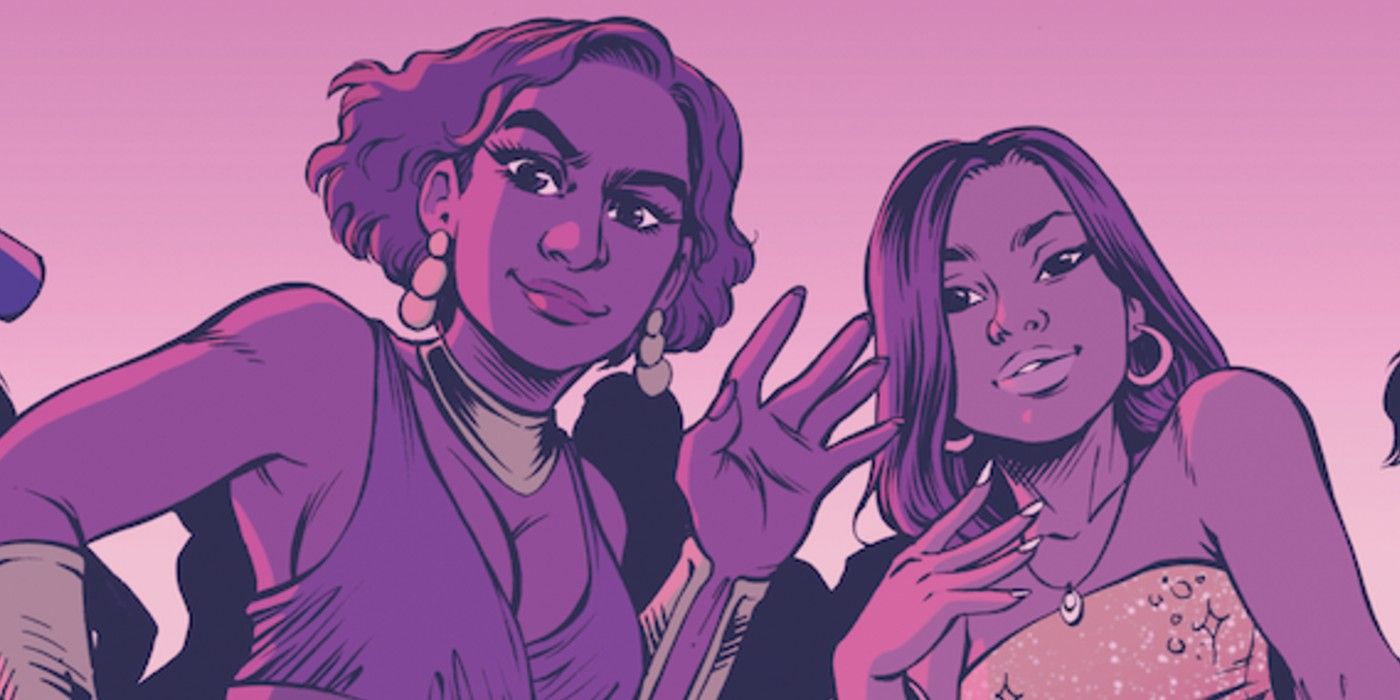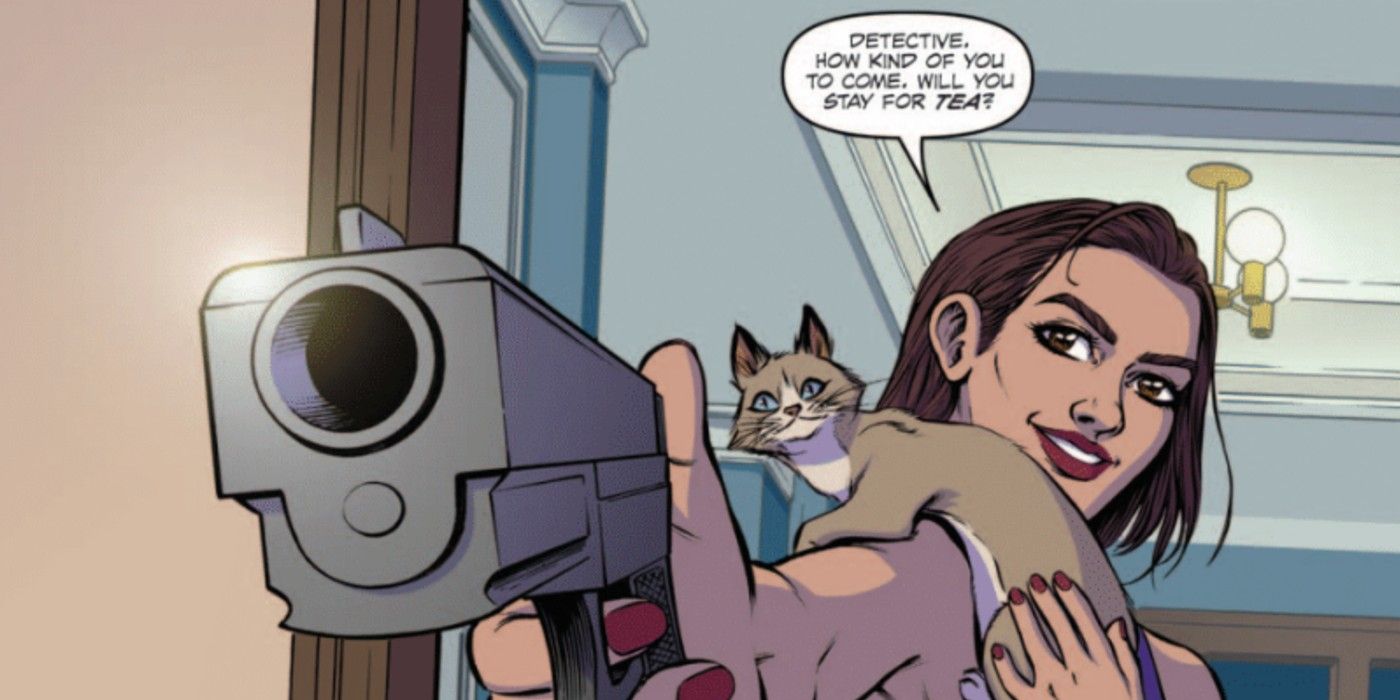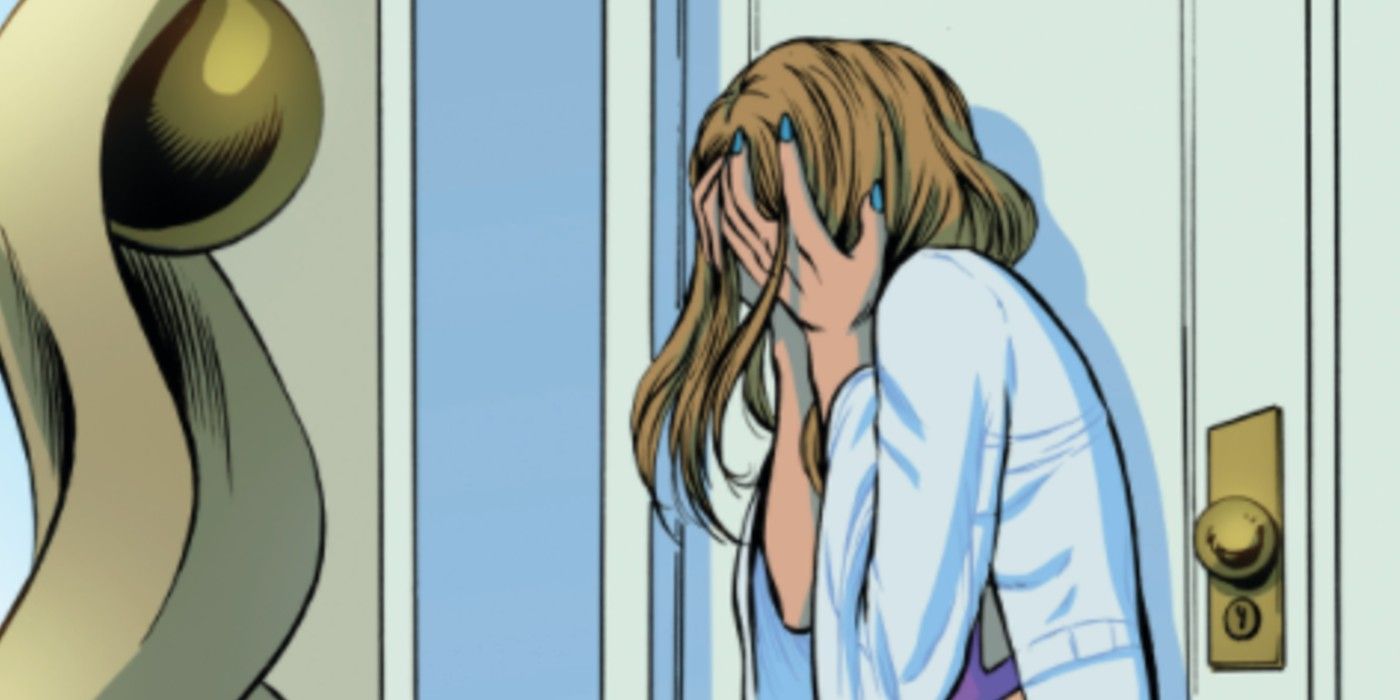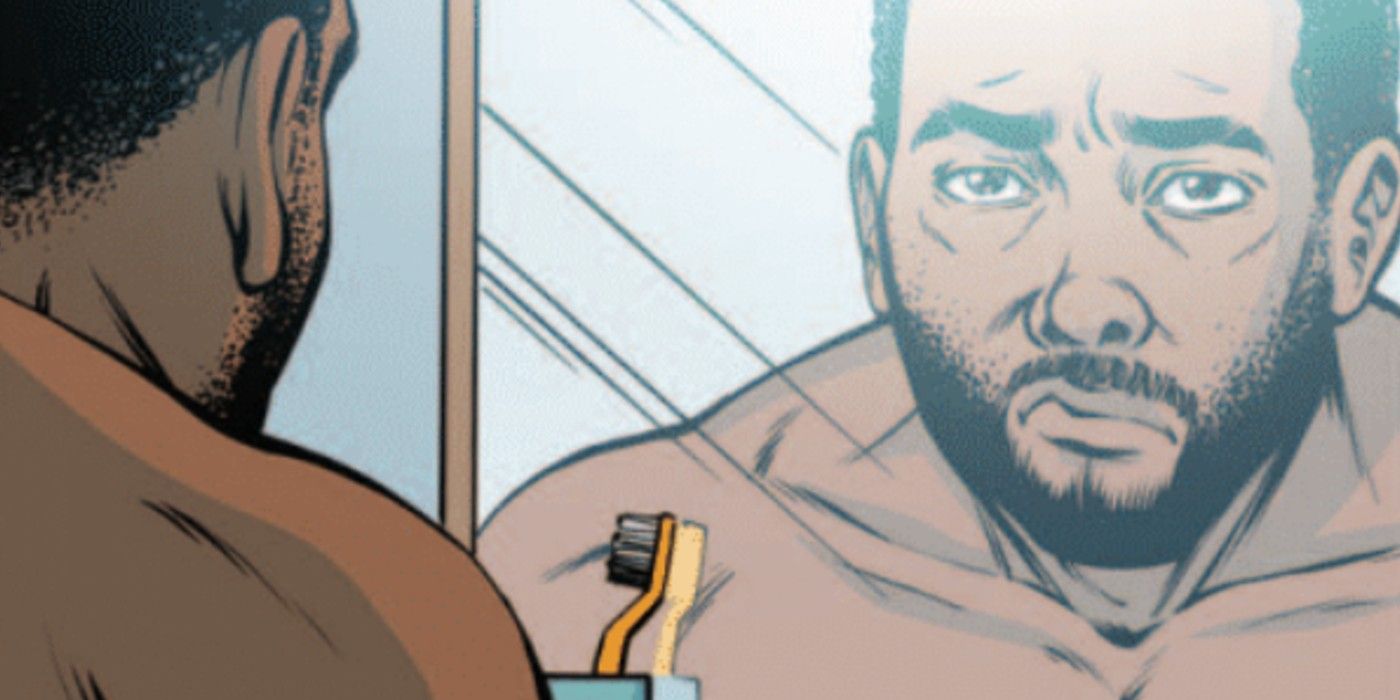
The Picture of Dorian Gray is a major staple of literature, despite having a complicated publication history. Written by Oscar Wilde, The Picture of Dorian Gray is about a man who sells his soul, allowing a portrait of himself to age while he doesn't. However, this leads Dorian into living a hedonistic, amoral life while maintaining his youth. This story has stayed with readers since the late 1800s and has seen several different adaptations and interpretations, including the new graphic novel Gray. Written by Arvind Ethan David, penciled by Eugenia Koumaki, inked by Diana Greenhalgh, colored by Joana Lafuente and with letters by Robbie Robbins, Gray altogether reimagines Dorian as a modern-day, revenge-seeking woman.
In Gray, the titular character is gender-bent and on a mission of retribution. However, this adaptation keeps some of Dorian's supernatural qualities that were present in the original novel. Backed by a popular Kickstarter, this project has not only exceeded its goals but also created a star-studded audio drama. With Volume 1 hitting shelves July 13, David sat with CBR for an exclusive interview about this unique project and his vision for the project.
CBR: Why make this story a reimagining of Dorian Gray?
Arvind Ethan David: I've been quietly obsessed with Oscar Wilde my whole life. I think I saw my first production -- it was a school production of The Importance of Being Earnest -- when I was in Singapore, of all places, when I was 12. And I remember physically the sensation that went through me. It was this sort of shock that language could do this, that theater could do this. And by this, it'll sort of both be absurdly funny and make you want to cry from laughing for three hours. But also, I had a sense at the time I didn't know what was being subverted. I wasn't mature enough or worldly enough to really understand that, but you had a sense that subversion was happening, that something dangerous was happening on the stage in front of you, and I sort of carried that with me.
I read Dorian Gray when I was about 19, and then I was hopefully beginning to get a sense of what was being subverted. I just always had it in the back of my mind it's a really sort of potent and dangerous work, and it was, right? It was banned or unpublished in its full form for nearly 50 years, long after Wilde died.
So that was one thing that was going on, and then the second thing that was going on was our world. It's a time where the dangers of our world -- the dangers that we pose to each other, the dangers of being alive in America, being a woman in America, being a person of color, being an immigrant, just disagreeing with people -- the dangers are very apparent.
Yeah.
I guess about two years ago, those two things smashed together in my head. There was a specific news story about some women who were going to clubs and picking up men and stealing from them. And I thought, "Oh that's interesting..." And then, as the MeToo movement sort of began to gather steam again about two years ago, I remember thinking, "Oh, what people are being punished for, at its core, was trying to live a life without consequences." Powerful men sort of decided that consequences didn't apply to them. Mainly men, not exclusively, but mainly men. That consequences didn't apply to them.
And then I went, "Oh, Dorian Gray is the morality fable about consequences." Fundamentally, that's what it is. Oscar posthumously sort of put this idea out there. He goes, "What if you can live a life free from consequence, free from any comeuppance? What would most people be?" And Dorian is the sort of grim answer to that question. So when those two things hit me together, I was like, "Oh, these two ideas are the same idea." Dorian Gray can speak to this moment in a way and that was the start of it.

Wonderful. Kind of touching on what you're saying about how we deal with a lot of different social issues in [Gray], which ones did you specifically want to make sure to put kind of at the forefront in this graphic novel/audio drama because there is a whole lot to unpack with this.
I think the issues have to come out of the story. So I couldn't go into this going, "I'm going to give 60 percent attention to sexual assault and 45 percent attention to Black Lives Matter." You can't take that away as a storyteller.
Right.
You start with the characters. And what I had was... In my version of Dorian, I have a woman who has been wronged, who's been assaulted, but who has also become, through magic, this kind of creature without consequences and a sort of immortal angel-demon of vengeance. In my version of Henry Wotton, my Hank Wotton, I have a Black police detective, who also has terrible trauma in his past, but who has responded to it very differently, has decided to become a sort of upholder of the law, of institutional values and norms, the reformer from within.
These two sorts of extreme versions, these two reactions, these two people who, in fact, the American dream has failed. Who The Constitution has not protected. A woman and a Black man, but they've responded very differently. What I thought was, "Let's have these two go at each other in every way." Let's have these two... I thought that was... those are two interesting characters. And, you know, as a man of color, as an immigrant, as someone married to a Black woman, I'm familiar with these arguments,
Right.
My wife is an institutionalist. I'm a revolutionary by temperament. I know what these arguments feel like. We have political arguments as well. They're those both on the right and the left who would tear things down to rebuild. Those who get called radical. AOC was a radical of the left. Trump was a radical of the right. And you get those who are incremental reformers. Obama was an incremental reformer. So I was interested in those characters and how they come smashing against each other.
So I thought, let's smash those two against each other in the way that George Clooney and Jennifer Lopez smashed against each other in Out of Sight, or in the way that Thomas Crown Affair, in the Pierce Brosnan Rene Russo version, they smash against each other. It's a game of cat and mouse. It's a game of who's smarter. It's also a game of sexual tension and attraction and ultimately love.
And I thought, "Let's play that as hard as we can." And so that's really what I was doing. I had these two incredible creations -- not my creations, Wilde's creations, the ones that I got to sort of make my own -- and let's put them up against each other. So out of that come all the issues. Out of that come the debates on Black Lives Matter and MeToo and vengeance and justice. That's where those issues come from. They come from characters.
What were your favorite characters to work on?
The thing about Dorian is she sort of writes herself. I've been lucky a few times in my career to find a character who's so thoroughly themself that all you have to do is put them in the situation and they do what they're going to do. It was true of Dirk Gently in my years working in the Douglas Adams Universe, working with Dirk Gently. Dirk always knows exactly who he is, and Dorian is the same. You know, having spent about 25 years in England and being English, and now being in America, there's unique humor and a unique sort of chemistry that happens when you put a sort of upper-class refined English oddity into mainstream American society.
Though Dorian is always fun to write, so is Hank because Hank is more my voice. Hank is more my experience of being a man of color in the US. But also, I'm writing in for the wonderful Neil Brown Jr., who I've listened to two or three times before. There's a sort of real hybrid that's happened between me and Neil, where Neil is my avatar in America, so I write him in American in Neil's voice, but with my thoughts. It's like my brain in Neil's body, which, you know, some people would say would be an improvement for me.

And speaking of kind of the media you're dealing with, you have a theatrical background, and you've worked on a few audio dramas, what prompted you to tell this story in the graphic novel medium and then translate it into an audio drama?
So I had this idea. It was one of these rare cases. Normally, when I have an idea, I know exactly what it is. When I had the idea for Jagged Little Pill, it was very clear it was a Broadway show. And with Dirk Gently it was very clear it'd be a TV series. It was sort of very specific.
With this, I wasn't sure. The only thing I knew was that it wasn't going to be a novel. Because if I actually wrote a novel, I'd have to compete with Oscar, and you don't want to do that. You don't to go toe to toe with one of the greatest masters of language that has ever lived. "Okay, I'm not going to do that," I thought, and the graphic novel idea came first. I was about halfway through it, and I was very much enjoying it, and I've written graphic novels before, and then I wrote an audio piece called The Neil Gaiman at the End of the Universe, which I wrote for Neil Gaiman and Jewel Staite, which came out on Audible about a month or six weeks ago.
I had such fun doing that. That was my first piece of audio writing since college. I hadn't done an audio -- what used to be called, where I come from, radio plays -- for 20 years. I had such fun doing it, and I suddenly realized that a thing that I'd wanted to do since college, which is to create an audio-drama that felt real. I always wanted to have a go at what Orson Welles did with War of the Worlds, which is this famous moment in radio history where the whole country thought that it was a real news broadcast, and aliens actually came, and thousands of people got in their cars and tried to drive to the ocean to escape. It's unimaginable. We say that now. It's unimaginable, except it's not. Because we are in a generation consumed with fake news, consumed with conspiracy theories, with millions of people who believe painted lies on the internet and painted lies coming out of the mouths of so called news anchors and so called journalists and so called politicians.
So I thought, "Oh my God!" We might actually be at a moment where playing with that is interesting again. Because, of course, the reason that Orson Welles could do what he did was that he lived also in the moment of existential fear about what might come with radio waves. The War of the Worlds broadcast happened in the context of a world terrified of nuclear war and terrified that any day the radio would say, "four-minute warning, get to a fallout shelter," and so in that context of sort of heightened anxiety, aliens on the radio seemed entirely reasonable, and everyone's reactions entirely proportionate. I think we live, unfortunately, in that sort of era of fear once again. Not fear this time of nuclear war, but fear of each other, and fear that there are evil forces in our own society and in our own governments and in our own institutions that can turn on us at any moment.
With that idea, I thought, "Oh, it's a true-crime podcast." It's a cold case that has never been solved, and we'll tell it from the future. And from 20 years from now, someone will be investigating this extraordinary crime, because what Dorian Gray does -- for those who [reading] this not having read the book -- but what Dorian Gray does, in my story, she perpetuates a sort of terrible terrorist act, a sort of horrific terrorist act. She kidnaps 10 of the most powerful and visible men in America and she tortures them on live stream, and she has good reason. So she has reasons that she articulates very well, and the men may or may not do terrible things. Many of them probably have. But she does this thing, and it changes the world, and it changes the world in the same way that a crime, like the assassination of Dr. King or the assassination of Lincoln or 9-11 changed the world. Those were gunshots that were heard the whole world over and changed the path of history. And I thought, "Okay, that's what my character is doing."
In this story, my version of the story, and I thought, oh, what better to investigate that than the true-crime podcast. A journalist obsessed with this secret mystery never fully solved, never fully punished. The second I had that idea, I thought, oh, I don't want to say I love all my children equally. I'm not gonna say it's more interesting than the graphic novel, but it afforded me the chance to do something very different, to go a lot deeper into the social, political, cultural morass that is the modern Western world, and examine it from 20 years from now to try and do the imagination.
The narrator of the audio drama -- calls herself Speranza -- is recording for 2040. And she's looking back at what took place in 2019. And so it gives me sort of the imaginative space to look at our time from a perspective and see what conclusions I can draw about the world we live in today. Now, I'm sure I'm not right. I'm not trying to be right or wrong. Hopefully, I'm interesting.

I wanted to go back to how you talked a little bit about War of the Worlds and, of course, this is also inspired by Dorian Gray. Were there any other inspirations when it came to developing the story for you?
I think there's sort of a straight line in both the English and the American tradition. So I do the English tradition of this. It goes Oscar Wilde, Evelyn Moore, P.G. Wodehouse, Monty Python, Douglas Adams. It's sort of a straight line for British comedy, all of which owe each other everything, but also were entirely original. And then Douglas Adams to Neil Gaiman. So there's this sort of direct line.
I am absurdly lucky that I spent a lot of my career working with and for and adapting those people. So I've worked with Neil Gaiman and written for him and adapted him. I've worked with Douglas Adams and adapted him, so and this is going back to my prime, my omega prime, to my OG. Oscar's where it all starts from. So you know, I feel I'm very much working in the tradition that has been my influence, and my heroes' influence my whole life. So that feels okay to me.
Then the American tradition. It's Mark Twain, to screwball comedy, to Marvel in all its durations, to what is the current sort of prime golden age of TV. There's sort of this straight line again, of comedy with knives, essentially, I would describe it. I think Dollhouse -- not Dollhouse -- Russian Doll is the gold now. We talked about this a lot when we were doing Dirk Gently. It's a comedy with knives, it's screwball with knives, where the dialogue is sharp, and the dresses are sharper, but the knives the sharpest of all of. It's real. It's real emotions. It's real characters. People get hurt. But everyone's always dazzlingly witty. And everyone's always well dressed and well educated at the same time.
And wrapping this up, what do you hope people take away from this story?
I hope that, again, I'm writing for the characters, not for the moral takeaway. But I hope that they see the complexity in all of this. Dorian is both someone who's been terribly wronged and deserves justice and someone who wades so far in blood that she's damned herself. Like both those things can be true. The pendulum can swing too far, not just for those innocent who've been hurt, but for those seeking justice and confusing justice for vengeance, there's is also a danger.
And also the other side of it. There are people who have done both good and terrible things, and somehow they exist in the same space. And that's something that cancel culture doesn't seem capable of recognizing. You can have people who have achieved greatness and left behind work that matters, that profoundly improves our world and our understanding of ourselves, and also were deeply unpleasant. Husbands, fathers, boyfriends, wives, uncles, those two things can happen at once. Oscar Wilde was a terrible husband, but, and by the way, got ultimately canceled. He's the first victim of cancel culture in our history. But the fact that he was a terrible husband, doesn't mean we shouldn't rejoice in The Importance of Being Earnest and cucumber sandwiches.
Written by Arvind Ethan David, pencils by Eugenia Koumaki, inks by Diana Greenhalgh, colors by Joana Lafuente and letters by Robbie Robbins, Gray is now available for purchase, with a shelf date of June 30. The audio drama, directed by Milena Govich, stars Lauren Patten as Dorian Gray, Neil Brown, Jr. as Detective Hank Wutan, Richard Schiff as Detective Augustus Bracknell, Samuel Barnett as Baron Claus Arnheim and Kiran Deol as Gwendolyn and will be available in the fall.
0 Comments